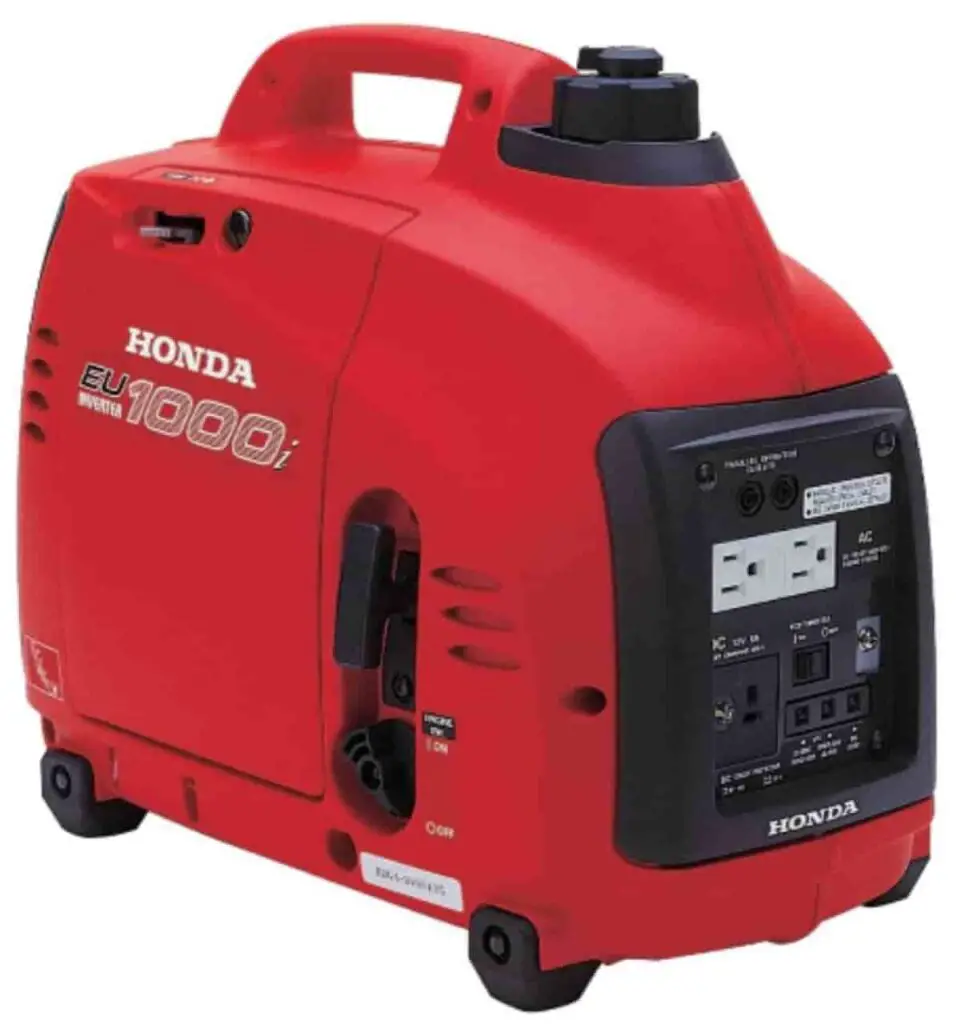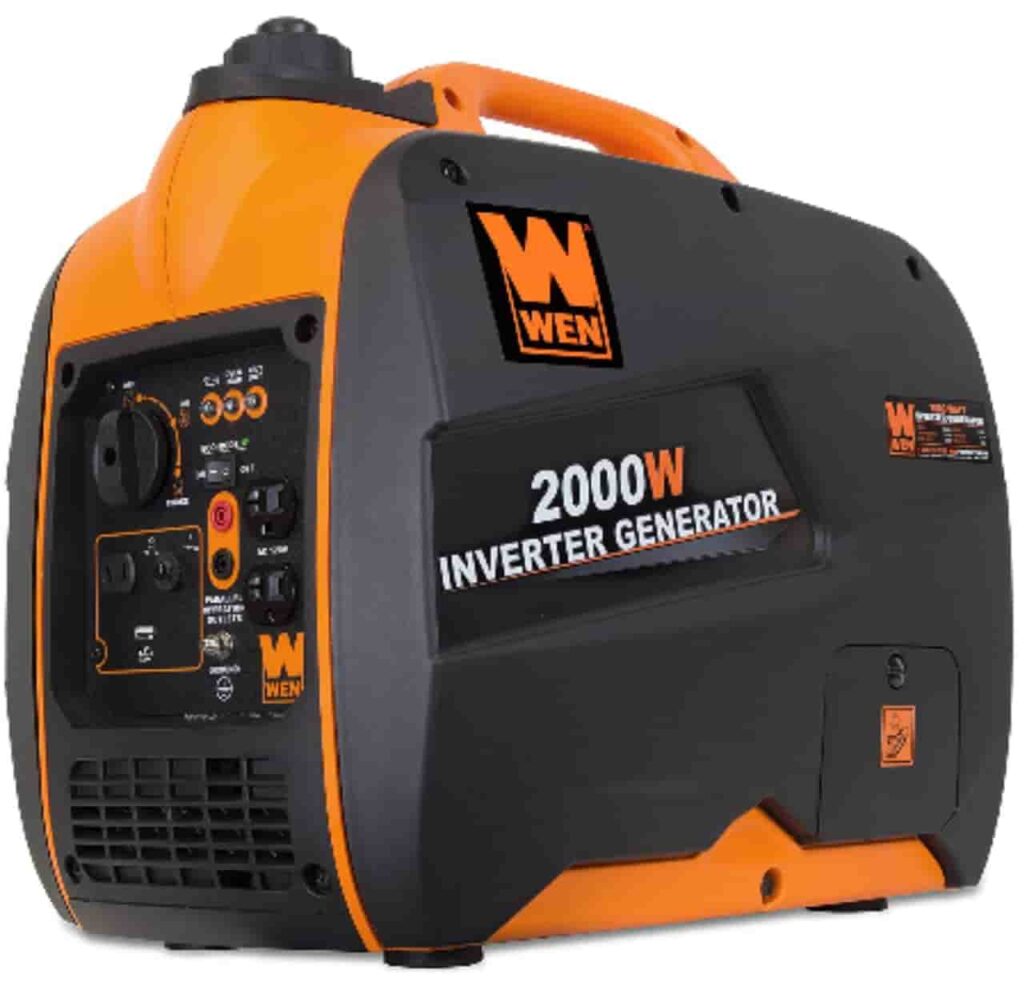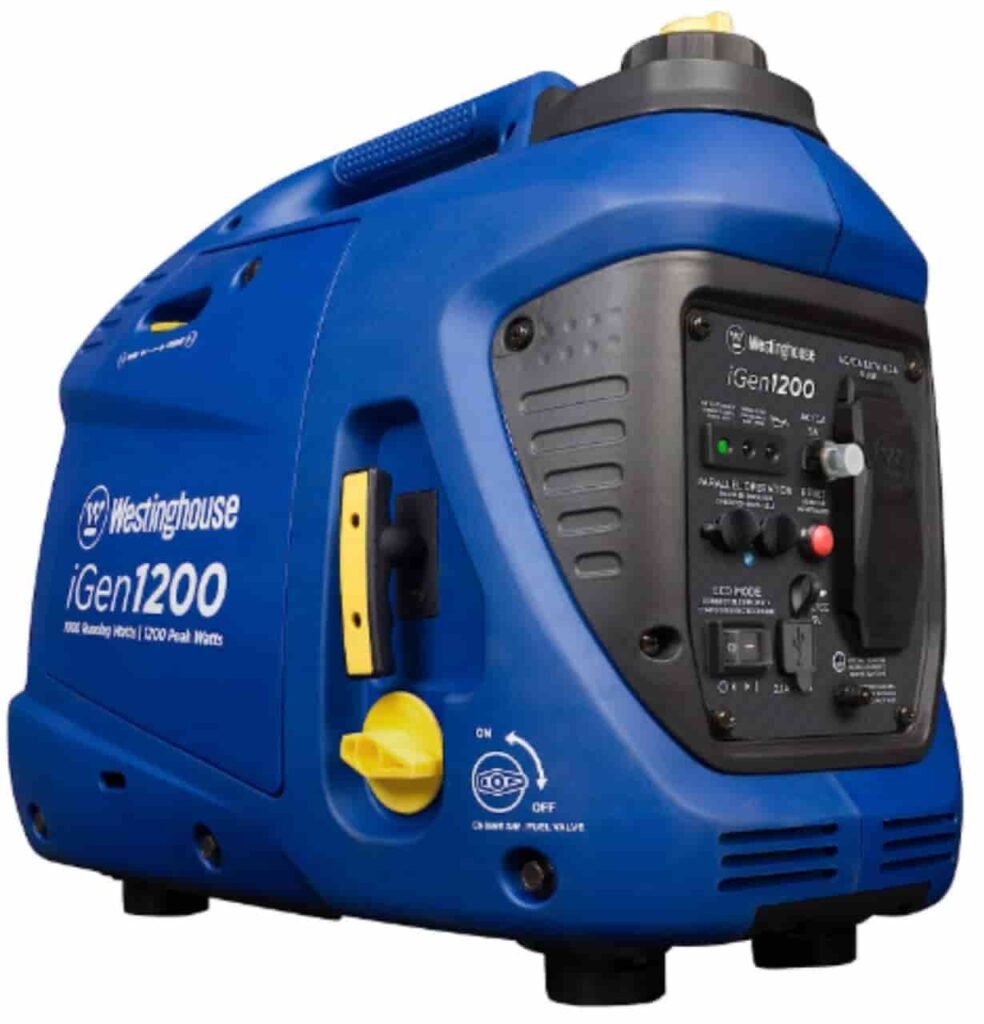As an Amazon Associate, we earn from qualifying purchases. This does not affect the price you pay or the quality of the products you buy. For more information, please read the full affiliate disclosure here.
Are you considering buying a 1000 watt generator as a portable power solution or backup during emergencies?
I know you might be wondering, “What will a 1000 watt generator run?” With its compact size and moderate power capacity, a 1000 watt generator offers versatility and convenience in various situations.
A 1000 watt generator can power a range of appliances and devices, making it a valuable resource for camping trips, outdoor activities, or small power needs.
Ranging from charging your smartphones and laptops to running energy-efficient LED lights and small kitchen appliances like coffee makers or blenders, a 1000 watt generator has you covered.
High-power appliances like refrigerators, air conditioners, or heavy-duty tools typically require more wattage than a 1000 watt generator can provide.
Hence, here at Generator Hacks, we will talk more about the capabilities of a 1000 watt generator, explore the types of appliances it can run and at the same time recommend top 1000 watt generators you should consider buying if you need one.
1000 Watt Generators: Our Top 4 Recommendations
| Product Name | Rated | Price |
| Honda EU1000i Portable Generator | Best Picked | Check On Amazon |
| WEN 56200i Portable Inverter Generator | Top Rated | Check On Amazon |
| Westinghouse iGen1200 Portable Generator | Affordable | Check On Amazon |
Why Are Watts Important in Determining the Capacity Of a Generator
The term wattage is a unit of measurement that quantifies the rate at which electrical power is consumed or produced. It represents the amount of energy transferred per unit of time. The watt (W) is the standard unit for measuring wattage.
In simple terms, wattage indicates how much power an appliance or device requires or consumes. It helps us understand the electrical load or demand of different devices and enables us to determine the appropriate capacity of a generator needed to power them.
The wattage requirements of appliances and devices are important in determining the capacity of a generator. Generator capacity is commonly measured in watts and represents the maximum amount of power the generator can deliver.
To ensure that a generator can adequately power the appliances and devices you want to run, it is important to calculate the total wattage requirement. This involves adding up the wattage ratings of each appliance or device you plan to operate simultaneously.
For example, if you have a refrigerator with a starting wattage of 800 watts and a running wattage of 600 watts, along with a laptop that requires 150 watts, and a few LED lights that consume 10 watts each, the total wattage requirement would be: 800 (refrigerator starting) + 600 (refrigerator running) + 150 (laptop) + 10 (LED light) + 10 (LED light) + 10 (LED light) = 1,580 watts.
In this case, you would need a generator with a capacity greater than or equal to 1,580 watts to power these devices simultaneously without overloading the generator. And for me, I would recommend you go for a 2000 watt generator.
Difference Between Starting Watt And Running Watt On 1000 Watt Generator
The difference between starting watts and running watts on a 1,000 watt generator refers to the power requirements of different appliances and devices when they start up versus when they are running continuously.
Starting watts, also known as surge watts or peak watts, represent the initial burst of power needed by certain appliances or devices when they are first turned on.
This initial surge is required to overcome the resistance or inertia in motors or compressors during startup. So, appliances like refrigerators, air conditioners, power tools, and some larger electronics typically have higher starting wattage requirements compared to their running wattage.
While running watts, also known as continuous watts or rated watts, represent the power required to keep an appliance or device running smoothly once it has started.
It refers to the steady power consumption of the device during its normal operation. For example, a laptop or an LED light bulb may have the same running wattage as their starting wattage because they maintain a consistent power draw once they are turned on.
On a 1,000 watt generator, the starting watts represent the maximum power surge it can handle for a brief period, while the running watts indicate the continuous power output it can sustain without overloading.
When calculating your wattage requirements for your generator, you must consider both the starting and running wattage requirements of the appliances and devices you intend to power to ensure that they are within the capabilities of the generator.
Additionally, it’s worth noting that some appliances, especially those with motors or compressors, may require additional starting watts that can exceed the generator’s capacity.
In such cases, it is recommended you use a generator with a higher wattage rating or consider a generator with a built-in feature like an automatic voltage regulator or load management system to handle these power surges more effectively.
Complete List Items/Appliances/Devices a 1000 Watt Generator Can Run
Thinking of items/appliances/devices a 1000 watt generator can run, here are a few ist we can think of.
Note; there are other things you can run with the generator that might not be listed here or let’s say the running watt or starting might not correspond with your appliances.
In that case, you should calculate the wattage yourself using the methods we suggested above making sure your total wattage calculated does not exceed 900 watts for an optimal functioning of the generator without you overloading it.
So, here is a list of items you can run on your 1000 watt generator with their starting and running watt.
| Appliance/Device | Starting Watt | Running Watt |
| Laptop | N/A | 30 to 300 Watt (Depending) |
| Smartphone Charger | N/A | 5 to 20 Watt (Depending) |
| LED Light Bulb | N/A | 2 to 20 Watt (Depending) |
| Portable Fan | N/A | 50 to 60 Watt (Depending) |
| Blender | N/A | 1000 to 1560 Watt (Depending) |
| Coffee Maker | N/A | 800 to 1200 Watt (Depending) |
| Electric Grill | 1000 to 1500 Watt (Depending) | |
| Electric Drill | 1800 Watt | 720 Watt |
| Portable Heater | N/A | 750 to 1500 Watt (Depending) |
| TV (LCD/LED) | N/A | 20 to 100 Watt (Depending) |
| Router | 1500 Watt | 600 Watt |
| Refrigerator | 1000 to 1500 Watt | 100 to 800 Watt |
| Gaming Console | 100 to 200 Watt (Depending) | |
| Iron | 800 to 3000 Watt | 1100 Watt |
| Electric Stove | 2000 to 5000 Watt | 1000 to 4000 watt |
Appliances You Shouldn’t Run With a 1000 Watt Generator
While a 1000 watt generator is versatile and capable of powering various appliances and devices, there are limitations to its capacity.
Here are some examples of things that a 1000 watt generator may not be able to run:
1. High-Powered Appliances: Appliances with high starting wattage requirements, such as refrigerators, air conditioners, electric water heaters, or large power tools, typically exceed the capacity of a 1000 watt generator. These appliances often require more power to start up and run continuously.
2. Heating Systems: Heating systems like electric furnaces or central heating units draw a significant amount of power. They typically require higher wattage capacities beyond what a 1000 watt generator can provide.
3. Large Power Tools: Power tools such as table saws, air compressors, or welders with substantial wattage demands are generally not suitable for a 1000 watt generator. These tools often require higher wattage ratings to operate effectively.
4. Home Appliances with Motors: Appliances with motors, like washing machines, dishwashers, or well pumps, may have high starting wattage requirements due to the initial power surge needed to start the motors. A 1000 watt generator might not provide sufficient starting power for these appliances.
5. High-Powered Electronics: Some high-powered electronics like gaming consoles, home theater systems, or desktop computers with powerful processors and graphics cards may exceed the capacity of a 1000 watt generator. These devices consume substantial power, especially under heavy usage or when multiple components are running simultaneously.
Note: You must always review the specific wattage requirements of the appliances and devices you intend to power and ensure they fall within the capacity of a 1000 watt generator or less.
If you have larger or high-power appliances that need to be powered, consider a generator with a higher wattage rating that would be more suitable to meet your power needs effectively and safely.
Also Check :- FAQs: What Will 8000 Watt Generator Run?
Factors to Consider When Choosing a 1000 Watt Generator
When selecting a 1000 watt generator, there are several factors to consider to ensure it meets your specific needs. Here are important factors you should keep in mind:
1. Power Output and Capacity: The generator’s power output should match your power requirements. A 1000 watt generator provides a maximum capacity of 1000 watts, but it’s essential to consider the starting wattage and running wattage of the appliances and devices you plan to power. Ensure that the generator can handle the total wattage without overloading.
2. Fuel Type: Generators can run on different fuel types, such as gasoline, propane, or diesel. Consider the availability and accessibility of the fuel type you prefer, as well as its cost and environmental impact.
3. Fuel Efficiency and Runtime: Assess the generator’s fuel efficiency, which determines how long it can run on a full tank of fuel. Look for information on runtime at different load capacities to understand how long it can sustain a power supply without refueling.
4. Noise Level: Generators produce varying levels of noise during operation. If noise is a concern, especially for camping or residential use, choose a generator with lower decibel ratings for quieter operation.
5. Portability: Consider the weight, size, and portability features of the generator. If you plan to use it for outdoor activities or require easy transportation, look for lightweight and compact models with handles or wheels for convenient portability.
6. Inverter Technology: Inverter generators produce clean and stable power, making them suitable for sensitive electronics. If you need to power devices like laptops, smartphones, or gaming consoles, consider a generator with inverter technology to prevent potential damage caused by power fluctuations.
7. Safety Features: Look for safety features such as low-oil shutdown, circuit breaker protection, and overload protection. These features help protect the generator’s engine and connected devices from damage in case of low oil levels or power surges.
8. Ease of Use and Controls: Consider the user-friendliness of the generator, including easy-to-understand controls, indicators, and features like electric start or remote start for convenient operation.
9. Brand Reputation and Warranty: Research the reputation and reliability of the generator brand. Check customer reviews and ratings to gauge user satisfaction. Additionally, consider the warranty offered by the manufacturer to ensure protection against potential defects or issues.
10. Price and Budget: Set a budget range and compare the features, specifications, and overall value of different generator models within that range. Consider long-term benefits and reliability rather than solely focusing on the initial cost.
Best 1000 Watt Generator: Our Top 5 Recommendations
Here are the top 5 best 1000 watt generators known for their great features and user experience:
1. Honda EU1000i Portable Generator

We picked the Honda EU1000i portable generator for its reliability, fuel efficiency, and quiet operation. It’s a dependable companion for outdoor adventures and power backup. You can trust it to provide clean and stable power for your sensitive electronics. Plus, its compact and portable design makes it a breeze to take with you wherever you go.
2. WEN 56200i Portable Inverter Generator

The WEN 56200i is a 2000 watt generator with a 1600 running watt. However, it stands out with its compact design, low noise levels, and multiple power outlets. It’s a handy companion for camping trips, tailgating, or powering small appliances during emergencies. You’ll appreciate its ease of use, quiet operation, and the convenience of having multiple outlets to connect your devices.
3. Westinghouse iGen1200 Portable Generator

The Westinghouse iGen1200 combines clean power output, fuel efficiency, and a compact design. It provides peace of mind with its reliable performance and quiet operation. Whether you’re camping, tailgating, or need backup power at home, the iGen1200 delivers the electricity you need while being easy to carry and store.
Final Thought
A 1000 watt portable generator is a versatile and convenient power solution that can provide electricity in various situations. Whether you’re camping, hosting outdoor events, or preparing for unexpected power outages, a reliable generator ensures you have the power you need.
Consider your power requirements, assess important factors like size, fuel efficiency, and noise levels, and explore the top 1000 watt generators we have recommended. With the right generator by your side, you can enjoy the benefits of portable power wherever you go.
Frequently Asked Questions
1. Can a 1000 watt portable generator power my entire house during a blackout?
No, a 1000 watt generator typically provides enough power to run small appliances, lights, and electronics. It may not have sufficient capacity to power all the appliances in your home simultaneously.
2. Can I connect multiple 1000 watt generators for more power?
While it’s technically possible to connect multiple generators, it’s not recommended due to potential complications with synchronization and power distribution. It’s better to invest in a generator with higher wattage if you need more power.
3. How long can a 1000 watt generator run on a full tank of fuel?
The runtime of a 1000 watt generator varies depending on the specific model and load. Some generators can run for several hours on a full tank, while others may have shorter runtimes. Check the manufacturer’s specifications for accurate information.
4. Can I run sensitive electronics like computers and TVs with a 1000 watt generator?
Yes, most 1000 watt generators provide stable and clean power output suitable for sensitive electronics. However, it’s advisable to use surge protectors or voltage regulators to ensure added protection.
5. How often should I service my 1000 watt portable generator?
You should often service your 1000 watt portable generator every 200 hours running.
🔌 Generator Tools & Social Hub
Maximize your generator knowledge! Use our calculators and join our community for expert tips:
Stay connected for updates and exclusive content:
📘 Facebook Page 🐦 X (Twitter) 📌 Pinterest 🔒 Private Facebook GroupDiscover more from Generator Hacks
Subscribe to get the latest posts sent to your email.